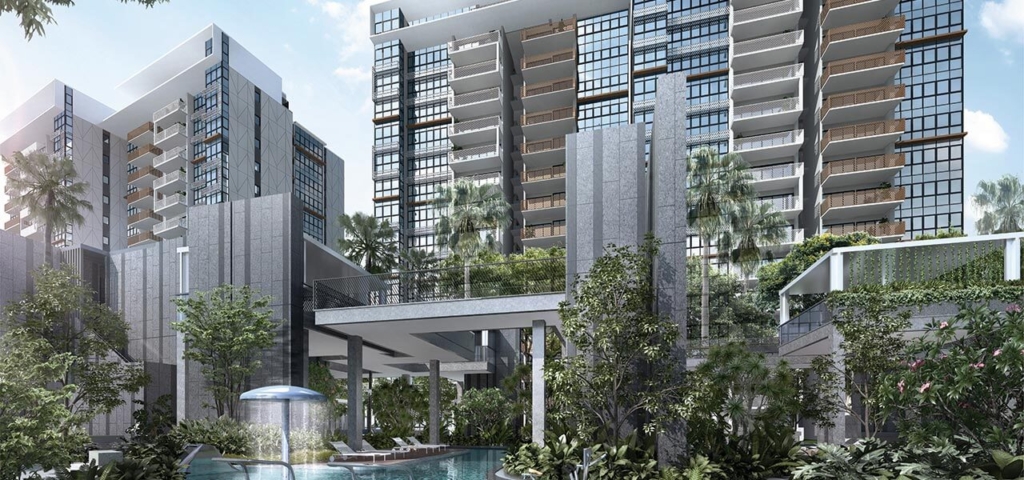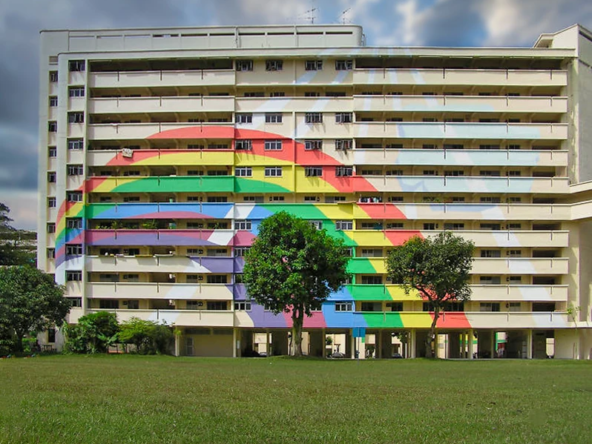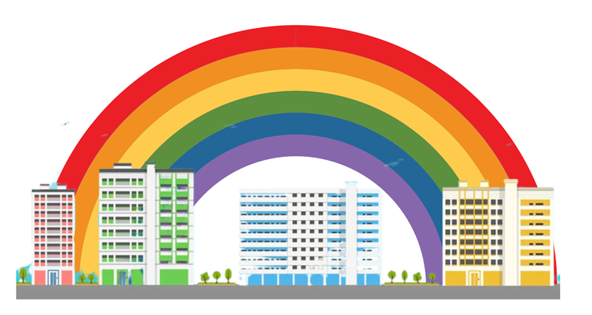In my years of helping LGBTQ+ clients with their home selection in Singapore, most of them would opt for HDB flats either from BTO scheme, or the resale market. For financially better off individuals, they have the additional choice of private properties like condominiums, apartments or even landed housing.
However, there is one property class that is often missed out by the LGBTQ+ community – the Executive Condo (EC). In this article, I will look at the option of EC and how it can be a viable option for different groups of LGBTQ+ in Singapore.
What is an EC?
Commonly known as the ‘sandwich flat’, EC was introduced in 1996 as an special class of property to cater to the needs of middle income home buyers; especially young graduates and professionals who can afford more than a HDB flat, but find private property to be out of their reach. Essentially it is a hybrid form of private-public housing, as it is first sold via HDB as public housing, but is automatically privatised after a 10 years period. Other than the title difference, a typical EC resembles a typical private condo and offer the same amenities, including swimming pools, gyms, clubhouses, tennis courts, etc. They are also managed by a management office with full guardhouse security.
However, buying a new EC does have its pros and cons.
The Pros
- New ECs are generally priced 20-30% lower then private new launches, so EC homeowners tend to enjoy a good upside potential when they decide to sell it after the five-year MOP period, or after 10 years when it is fully privatised.
- For eligible family units with combined household income below $12,000, there is a HDB Housing Grant for EC of up to $30,000 to subsidise the purchase of the property. (However, this grant is NOT available to those buying under the Joint Singles Scheme)
- HDB owners upgrading to ECs do not have to pay ABSD as it is mandatory for them to sell their HDB upon TOP of the EC.
- These HDB upgraders do not have to sell their current property first. They can continue to live in their flat while waiting for the construction of the ECs to complete (4-5 years) and sell it later upon TOP.
- HDB upgraders can still get a 75% home loan even if they have an existing loan. This will allow them to secure the loan needed for the EC with no financial issues.
The Cons
- One of the main drawbacks of EC is the required five-year MOP on top of the four to five years of construction. This is a similar timeline to BTO flats purchased from HDB. What it means for buyers is that they will not be able to buy or sell another property for a good 9-10 years period.
- Because of the the hybrid nature of ECs, they will only be fully privatised after the 10th year from TOP. So foreigners can only buy a fully privatised EC after 10 years. (Note: SPRs however are allowed to buy EC after five years.)

Can a LGBTQ+ person buy a new EC from launch?
Unlike buying a private condo, buying an EC at launch from HDB comes with its own set of eligible criteria:
| Family nucleus | You will need to qualify for the EC under one of these eligibility schemes:- Public Scheme- Fiancé/Fiancée Scheme- Orphans Scheme- Joint Singles Scheme |
| Citizenship | – You must be a Singapore Citizen- At least 1 other applicant must be a Singapore Citizen or Singapore Permanent Resident- All singles must be Singapore Citizens if applying under the Joint Singles Scheme |
| Age | – At least 21 years old- At least 35 years old, if applying under the Joint Singles Scheme |
| Income ceiling | Your combined household income must not exceed $16,000 |
| Property ownership | – You do not own other properties overseas or locally, or have not disposed of any within the last 30 months- You have not bought a new HDB/DBSS flat or EC, or received a CPF Housing Grant before; or, have only bought one of these properties/received one CPF Housing Grant thus far |
As seen in the table above, a single LGBTQ+ person will not be able to qualify for a new EC on their own. The only way is to apply under the Joint Singles Scheme. So for a Singaporean LGBTQ+ couple, they do have a chance to buy a brand new EC together under these conditions.
Joint Singles Scheme
You and up to 3 other co-applicants, and all of you are:
- Single (unmarried, divorced, or widowed)
- Singapore Citizens
- At least 35 years old
- Applying jointly as co-applicants
- The CPF Housing Grant is NOT available when buying an EC under Joint Singles Scheme
At first glance, the age restriction, five-year MOP requirement and lack of housing grant for the “joint single” owners will make EC an unattractive option for LGBTQ+ couples. They could simply enter the private property market to buy something without any of these restrictions.
However, private new launches and resale properties are becoming more expensive than ever. New ECs are generally priced 20-30% lower than the private condominium in the market. For a LGBTQ+ couple looking for an own-stay home with no plans to sell in the short term, getting an EC is a very good option if they are not bothered by its five-year MOP and 10-year privatisation timeline. On top of that, they also stand a very good chance of capital appreciation over the years.
Another clear advantage of new ECs for LGBTQ+ couples is that they are not limited by the type of units, unlike for BTO, where they are only allowed to buy a 2-room flex unit in a non-matured HDB estate.
For LGBTQ+ couples who own existing properties and are planning to transition to another private property, they are also NOT ABLE to enjoy ABSD remission (unlike married heterosexual couples who can). If they want to buy a private new launch together, they will need to first sell away their current property to avoid a 17% ABSD (on the 2nd new property) and rent a place for three to four years while waiting the for the construction to complete. As a result of this, they are less likely to buy a new launch and be limited to resale private properties (check out my previous article on this subject).
On the other hand, buyers of ECs are exempted from ABSD and they do not have to sell away their HDB until the TOP of the EC, this is a huge advantage for LGBTQ+ home owners who are trying to upgrade from an HDB to a brand new property.

Not Forgetting The Opportunities in Resale ECs
We have looked at the various possibilities of buying a brand new EC, but there are many LGBTQ+ who are still left out of the equation. They are:
- Singaporeans below 35 years old
- Singles (non-couple LGBTQ+)
- Singapore Permanent Residents ( SPRs)
- Foreigners
Here’s the good news! Consider buying something from the resale EC market. It has a lot more flexibility for these groups of people.
Two very important milestones for a typical EC is the five-year Minimum Occupation Period (MOP) date, followed by its 10th year privatisation mark.
Upon completion of the Minimum Occupation Period (MOP) of five years, an EC is considered ‘semi-privatised’.
- The property can now be sold in the private resale market without going through HDB
- The property can now be sold to Singaporeans and SPRs (but ABSD still applies)
- There is no more need to meet the previous HDB family nucleus criteria
- There is no more of an age restriction (35 years old) for singles.
- There is also no income restriction.
The final turning point for the EC is after its 10th year, when it will be ‘fully-privatised’ and sold as private property. The important change at that point is that foreigners would then be eligible to buy the property in the open resale market.
All of the above possibilities by resale ECs have opened up many options for the LGBTQ+ community who are looking for an alternative to HDB housing, but could not afford the expensive private properties. It is also good way for LGBTQ+ members who own a HDB flat to afford a hybrid housing before transitioning to the private segment if they want.
Finally, the resale EC option provides LGBTQ+ couples of different nationalities the opportunity to plan and co-invest in a home together in Singapore. This was impossible under the HDB policies with its strict eligible criteria on family unit. For a fully privatised resale EC, Singaporeans, SPR and foreigners can buy the properties together as co-owners. However, do note that the ABSD for SPR and foreigners still applies, so it is crucial for all parties to structure the purchase carefully.
At the point of writing, gay marriage is not legalised in Singapore, so there are many details and points to consider when co-sharing financial assets and properties as an LGBTQ+ couple. As such, it is of paramount importance to consult LGBTQ+ affirming professionals experienced in legal, financial planning and real estate when you embark on this exciting journey together.




